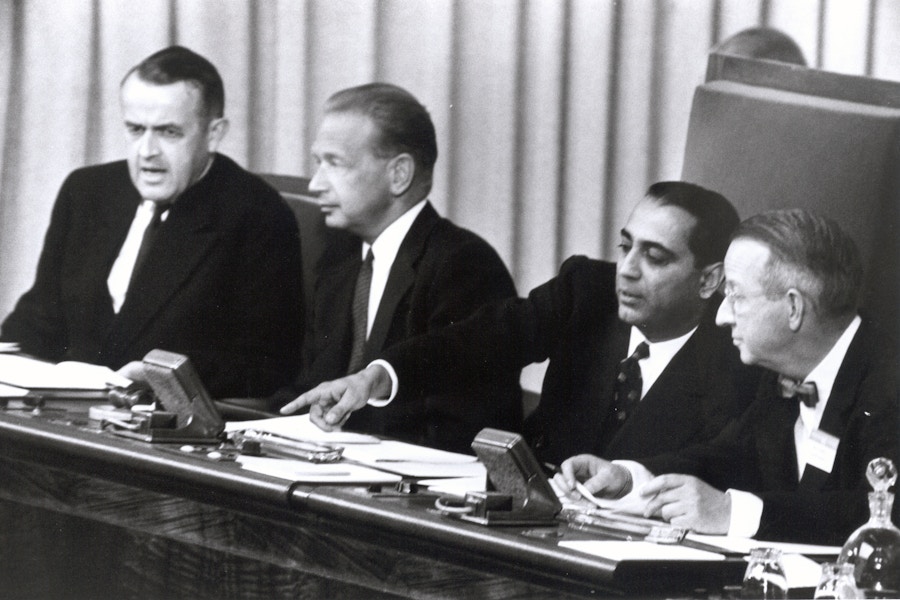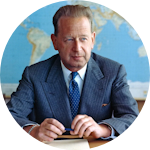Introductory Note:
Dag Hammarskjöld (1905–1961) was an important political figure in the twentieth century. He served as Secretary-General of the United Nations from 1953 to 1961, when he died in a plane crash while on a peace mission in the Congo. Hammarskjöld’s journals written during the 1940’s and 1950’s were posthumously published under the title Markings. In Markings we see Hammarskjöld’s questions, prayers, spiritual insights and aspirations.
In Devotional Classics, Richard Foster and James Bryan Smith note about Hammarskjöld’s journals, “Throughout this fascinating self-portrait Hammarskjöld does not make a single direct reference to his distinguished career as an international civil servant; neither does he mention the many presidents, kings, and prime ministers with whom he had dealings, or the dramatic historical events in which he played a central role.” His journals show that he longed to live faithfully and humbly, and to hold his prominent position with the mindset of a servant.
Renovaré Team
12.24.56
Your own efforts “did not bring it to pass,” only God — but rejoice if God found a use for your efforts in His work. Rejoice if you feel that what you did was “necessary,” but remember, even so, that you were simply the instrument by means of which He added one tiny grain to the Universe He has created for His own purposes….
***
How humble the tool when praised for what the hand has done.
***
It was when Lucifer first congratulated himself upon his angelic behavior that he became the tool of evil.
***
We have to acquire a peace and balance of mind such that we can give every word of criticism its due weight, and humble ourselves before every word of praise.
***
What distinguishes the “elite” from the masses is only their insistence upon “quality.” This implies a responsibility, to all for all, to the past for the future, which is the reflection of a humble and spontaneous response to Life with its endless possibilities, and its unique present which never happens twice.
***
Twice now you have done him an injustice. In spite of the fact that you were “right” or, more correctly, because you were, in your conceit and your stupid pride in your powers you went stumping on over ground where each step gave him pain.
***
Have mercy on us.
Have mercy on all our efforts, that we
Before thee, in love and faith,
Righteousness and humility,
May follow thee, with self denial,
Steadfastness and courage,
And meet thee in the silence.
Give us a pure heart that we may see thee,
A humble heart that we may hear thee,
A heart of love that we may serve thee,
A heart of faith that we may love thee.
***
The humility which comes from others having faith in you.
***
When you are irritated by his “pretentiousness,” you betray the character of your own: it is just as it should be that he increases while you decrease. Choose your opponents. To the wrong ones, you cannot afford to give a thought, but you must help the right ones, help them and yourself in a contest without tension.
***
To remain a recipient out of humility. And preserve your flexibility.
To remain a recipient and be grateful. Grateful for being allowed to listen, to observe, to understand.
There is a profound causal relation between the height of a man’s ambition and the depth of his possible fall.
***
The “great” commitment all too easily obscures the “little” one. But without the humility and warmth which you have to develop in your relations to the few with whom you are personally involved, you will never be able to do anything for the many. Without them, you will live in a world of abstractions, where your solipsism, your greed for power, and your death-wish lack the one opponent which is stronger than they — love. Love, which is without an object, the outflowing of a power released by self-surrender, but which would remain a sublime sort of superhuman self-assertion, powerless against the negative forces within you, if it were not tamed by the yoke of human intimacy and warmed by its tenderness. …
***
Maturity: among other things, a new lack of self-consciousness — the kind you can only attain when you have become entirely indifferent to yourself through an absolute assent to your fate.
He who has placed himself in God’s hands stands free vis-á-vis men: he is entirely at his ease with them, because he has granted them the right to judge.
***
Not I, but God in me.
***
Your position never gives you the right to command. It only imposes on you the duty of so living your life that others can receive your orders without being humiliated.
***
Thou who art over us,
Thou who art one of us,
Thou who art—
Also within us,
May all see Thee — in me also,
May I prepare the way for Thee,
May I thank Thee for all that shall fall to my lot,
May I also not forget the needs of others,
Keep me in Thy love
As Thou wouldest that all should be kept in mine.
May everything in this my being be directed to Thy glory
And may I never despair.
For I am under Thy hand,
And in Thee is all power and goodness.
Originally from Markings by Dag Hammarskjöld. New York: Ballentine, 1983.
Photo Credit: United Nations / New York. Seen here (left to right), at the rostrum of the Palais des Nations’ Assembly hall for the opening of the International Conference on Peaceful Uses of Atomic Energy: Mr. Max Petitpierre, President of the Swiss Confederation, U.N. Secretary General Dag Hammarskjold, Dr. Homi J. Bhabha of India, President of the Conference, and Prof. Walter G. Whitman from the United States, Conference Secretary General. (Geneva, Switzerland, August 8, 1955)
Text First Published October 1964 · Last Featured on Renovare.org December 2022


